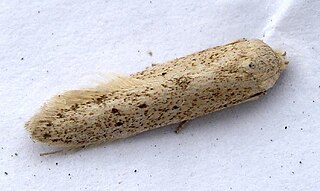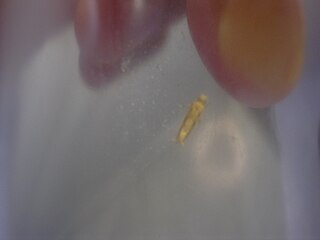
The Blastobasidae are a family of moths in the superfamily Gelechioidea. Its species can be found almost anywhere in the world, though in some places they are not native but introduced by humans. In some arrangements, these moths are included in the case-bearer family (Coleophoridae) as subfamily Blastobasinae. The Symmocidae are sometimes included in the Blastobasidae as subfamily or tribe.

Anacampsis is a worldwide genus of moth with most found in the nearctic and neotropical regions. It is in the family Gelechiidae. The larvae feed on a range of deciduous trees and shrubs in a rolled or folded leaf, or spun shoot.

Aristotelia is a genus of moths in the family Gelechiidae. Well-known species are food plant specialists, and diverse hosts are used – Salicaceae, Solanaceae, Rosaceae, Fagaceae, Fabaceae, Asteraceae.
Auximobasis is a genus of the gelechioid moth family Blastobasidae. It is sometimes included in Blastobasis.

Blastobasis is the type genus of the gelechioid moth family Blastobasidae; in some arrangements these are placed in the case-bearer family (Coleophoridae) as a subfamily. Within the Blastobasidae, the subfamily Blastobasinae has been established to distinguish the Blastobasis lineage from the group around Holcocera, but the delimitation is not yet well-resolved.

Coelostathma is a genus of moths belonging to the subfamily Tortricinae of the family Tortricidae.

Erechthias minuscula, the erechthias clothes moth, is a moth of the family Tineidae. It was first described by Lord Walsingham in 1897. It is widespread and has been recorded from Africa, Sri Lanka, Java, Australia, the Caroline Islands, Fiji, Samoa, the Marquesas, the West Indies, Hawaii and Florida.
Acrocercops ornata is a moth of the family Gracillariidae, known from Grenada. It was described by Thomas de Grey, 6th Baron Walsingham, in 1897.

Gracillariinae are a subfamily of moths which was described by Henry Tibbats Stainton in 1854.
Auximobasis brevipalpella is a moth in the family Blastobasidae. It was described by Walsingham in 1897. It is found in the West Indies.
Auximobasis constans is a moth in the family Blastobasidae. It was described by Walsingham in 1897. It is found in the West Indies.
Auximobasis flaviciliata is a moth in the family Blastobasidae. It was described by Walsingham in 1897. It is found in the West Indies.
Auximobasis persimilella is a moth in the family Blastobasidae. It was described by Walsingham in 1891. It is found in the West Indies.
Auximobasis bromeliae is a moth in the family Blastobasidae. It was described by Walsingham in 1912. It is found in Mexico.
Auximobasis neptes is a moth in the family Blastobasidae. It was described by Walsingham in 1912. It is found in Mexico.
Auximobasis tarachodes is a moth in the family Blastobasidae. It was described by Walsingham in 1912. It is found in Central America.

Stathmopodidae is a family of moths in the moth superfamily Gelechioidea described by Edward Meyrick in 1913.

Acrocercopinae is a subfamily of moths described by Akito Yuji Kawahara and Issei Ohshima in 2016.








